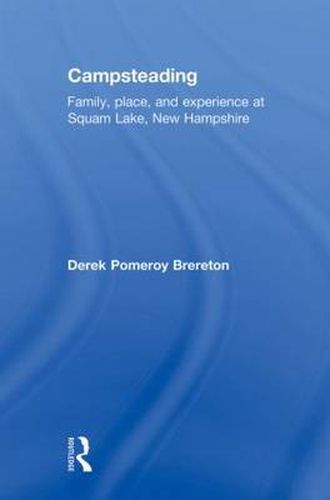Readings Newsletter
Become a Readings Member to make your shopping experience even easier.
Sign in or sign up for free!
You’re not far away from qualifying for FREE standard shipping within Australia
You’ve qualified for FREE standard shipping within Australia
The cart is loading…






The campstead is an American institution. After the Civil War, with neo-colonialism, environmentalism, and arts-and-crafts on the rise, some families sought rural locations for rustic camps. There they raised their children in the summertime. Around Squam Lake, after some eight generations, twenty-one such camps remain in these families.
The Squam area thus becomes a natural place to study relationships of persons and places, families and landscape, and humans and the world. Our present concerns for environmental stewardship, open space protection, and core values instead of consumerism, make this a good time to revisit the simple American Campstead.
Rustic camping itself revisited aspects of the American frontier. Just as the western frontier was disappearing, some families resorted to remnants of the first frontier among mountains and lakes of the Northeast. Through campsteads, these families preserved elements of the frontier ethos. Campsteads facilitate particular experiences involving nature and family. Brereton investigates campstead experience, and through it the nature of human experience generally.
This book is the first detailed account of campsteading, the first application of critical realism in anthropology, and the first anthropological use of John Dewey’s evolutionary model of experience. Building on Dewey, the author further analyses experience into its levels, orders, and features.
$9.00 standard shipping within Australia
FREE standard shipping within Australia for orders over $100.00
Express & International shipping calculated at checkout
The campstead is an American institution. After the Civil War, with neo-colonialism, environmentalism, and arts-and-crafts on the rise, some families sought rural locations for rustic camps. There they raised their children in the summertime. Around Squam Lake, after some eight generations, twenty-one such camps remain in these families.
The Squam area thus becomes a natural place to study relationships of persons and places, families and landscape, and humans and the world. Our present concerns for environmental stewardship, open space protection, and core values instead of consumerism, make this a good time to revisit the simple American Campstead.
Rustic camping itself revisited aspects of the American frontier. Just as the western frontier was disappearing, some families resorted to remnants of the first frontier among mountains and lakes of the Northeast. Through campsteads, these families preserved elements of the frontier ethos. Campsteads facilitate particular experiences involving nature and family. Brereton investigates campstead experience, and through it the nature of human experience generally.
This book is the first detailed account of campsteading, the first application of critical realism in anthropology, and the first anthropological use of John Dewey’s evolutionary model of experience. Building on Dewey, the author further analyses experience into its levels, orders, and features.